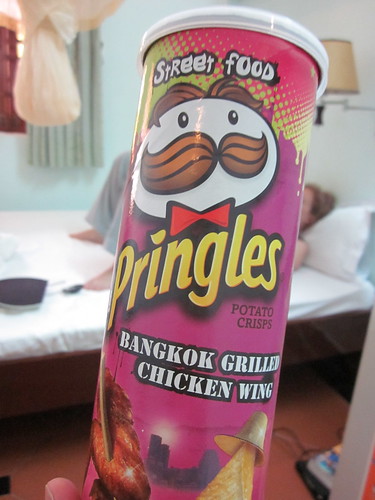Sampling Local Flavor…
Let me take you on a culinary journey. You don’t need even need to leave the States to experience some SE asian magic… They don’t sell these in the U.S., but I have identified all the mystical flavors that, when combined, conjure up such an authentic Siamese dish.
Here’s the recipe:
- Throw out noodles.
- Open the flavoring package and dump in the open Pringles can.
- Shake that shit up!
- Taste one.
- Then taste two.
- Then throw the whole thing out; really, it’s pretty gross.
- …
- Suddenly you want more. Did you throw it in the garbage? Maybe it’s still sealed. MSG, she is a harsh mistress…
Of Duck Fetuses and Spider Asses
This is a post about food.
Cambodians, it is said, will eat anything (except dog, which they leave to the Vietnamese). Whether this is from the starvation years under the Khmer Rouge or simply a function of a traditional culture that has changed little over a thousand years… that seems up for debate.
Until our bus ride to Siem Reap, I hadn’t really seen this phenomenon in action. True, when you are a tourist, many times the food on offer at even the most “authentic” seeming restaurant/food stall is limited to your presumed palate. The countless offerings of “fried noodle or rice with [insert meat here]” were broken up with respites of amok (a coconut curry, distinct from but not unlike a Thai curry) lok lak (stir-fried beef with a lemon pepper sauce), a preserved lemon soup, and bor bor (a standard meal for Khmers, rice porridge with meat and fermented soybeans). But sometimes the really great stuff is in the most innocuous food stall or cart, and you’ll never find the good stuff unless you are willing to try the boring or bad.
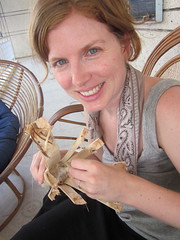 One wonderful bus stop snack is called krahon, and consists of a bamboo tube with a concoction of coconut milk, sticky rice and dried soybeans inside. Another delightful surprise was nehm; raw spiced river fish wrapped in edible leaves (mine was fresh and wonderful, but sadly at first Courtney didn’t get to try hers, a sad little banana-leaf-wrapped package that had mold on the inside. Er-er. But we went back and bought a bundle of them later). There are also small freshwater clams carried around on head-balanced baskets. These are everywhere, and were very tempting, but then I found out these little guys are just dried, and even Cambodian doctors are trying to get people to stop eating these due to worms and bacteria giving people food poisoning and diarrhea. Thanks, but we’ve already done that this trip.
One wonderful bus stop snack is called krahon, and consists of a bamboo tube with a concoction of coconut milk, sticky rice and dried soybeans inside. Another delightful surprise was nehm; raw spiced river fish wrapped in edible leaves (mine was fresh and wonderful, but sadly at first Courtney didn’t get to try hers, a sad little banana-leaf-wrapped package that had mold on the inside. Er-er. But we went back and bought a bundle of them later). There are also small freshwater clams carried around on head-balanced baskets. These are everywhere, and were very tempting, but then I found out these little guys are just dried, and even Cambodian doctors are trying to get people to stop eating these due to worms and bacteria giving people food poisoning and diarrhea. Thanks, but we’ve already done that this trip.
Then there are the insects, which we yet hope to try.
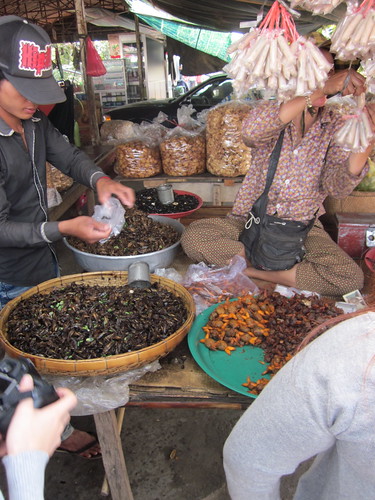 The idea of eating a bug almost seems like a novelty, something meant to intrigue kids and show up on “weird food” programs and reality shows. We thought these would be trotted out for the tourists, and indeed Courtney said she did see some crickets frying in that tourist mecca, Khao San Rd. But in Cambodia the closest we’ve come to these is passing through the town of Skuon on the way to Siem Reap. There they were among the market stalls at the bus rest stop, giant piles of crickets in baskets next to… big-ass spiders, the kind that most definitely had some “fur” on them when they were still crawling. I got excited; to me this was like breaking some sort of lock that was preventing me from being able to say “I will eat anything once”. I stood for a moment, fishing for some small bills in my pocket, as excited as a child (for example, one who’s about to eat a bug)…
The idea of eating a bug almost seems like a novelty, something meant to intrigue kids and show up on “weird food” programs and reality shows. We thought these would be trotted out for the tourists, and indeed Courtney said she did see some crickets frying in that tourist mecca, Khao San Rd. But in Cambodia the closest we’ve come to these is passing through the town of Skuon on the way to Siem Reap. There they were among the market stalls at the bus rest stop, giant piles of crickets in baskets next to… big-ass spiders, the kind that most definitely had some “fur” on them when they were still crawling. I got excited; to me this was like breaking some sort of lock that was preventing me from being able to say “I will eat anything once”. I stood for a moment, fishing for some small bills in my pocket, as excited as a child (for example, one who’s about to eat a bug)…
But…
There was this smell. At first I thought it was like rotten vegetables. Then it reminded me of a diaper. A full one. I couldn’t do it. After I had backed away, I returned a few times, but always left in revulsion. The door would have to stay shut. I would not eat a shitty-smelling bug. Not today.
So what was I talking about? What I’m driving at (digressions aside), is that while Cambodia is not known for having as diverse of a culinary range as Thailand or Vietnam, so far I’ve just covered some of the street food. And the most ubiquitous street food, here in the eastern portion of the country, is the innocent-looking egg.
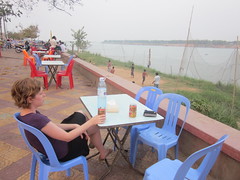 In Kompong Cham and Kratie, the two Mekong river towns we’ve stayed in for the last few days, there are tons of food and beer stalls along the riverfront. They’re the perfect place to grab a cold beer and watch the sun go down, which is especially satisfying since the temperature is doing the same. These places usually have a blender to make you a fresh fruit shake and maybe a propane heater to make you some greasy noodles with a farm-fresh fried egg on top. But they always have a charcoal-heated pot of water with eggs in it. We were curious, do people really love hard-boiled eggs in this place? But we had also heard something else, something that would slam the doorway to “I’ll eat anything” forever. We needed to confirm it. After a couple sunset beers, we went up to the pot of eggs, peering at one that was partially cracked.
In Kompong Cham and Kratie, the two Mekong river towns we’ve stayed in for the last few days, there are tons of food and beer stalls along the riverfront. They’re the perfect place to grab a cold beer and watch the sun go down, which is especially satisfying since the temperature is doing the same. These places usually have a blender to make you a fresh fruit shake and maybe a propane heater to make you some greasy noodles with a farm-fresh fried egg on top. But they always have a charcoal-heated pot of water with eggs in it. We were curious, do people really love hard-boiled eggs in this place? But we had also heard something else, something that would slam the doorway to “I’ll eat anything” forever. We needed to confirm it. After a couple sunset beers, we went up to the pot of eggs, peering at one that was partially cracked.
“Are those….?” we asked the woman who ran the place.
“Jaaaa” she said, grinning happily, as she started to flap her hands like little wings, and make bird noises. “Cheep-cheep” she chirped, giggling sweetly.
The door sealed shut like a tomb. One more bit of personal myth-making obliterated.
Perhaps in Cambodia, cheep-cheep is what baby ducks say, or what they would say, if there were not still fetuses. The people who eat them first crack open the top of the egg and suck out the juice before consuming it (for long life!). I was not shocked by the fact that someone would eat duck fetus, but what I was, and still am shocked by is the popularity of the duck fetus. There are perhaps 30-40 food stalls across the street from our guesthouse, each with a large pot of these eggs and small groups of people enjoying a large plate of them (along with a vast and delicious-looking array of condiments, I might add).
The people of Cambodia have consistently impressed us; they are so warm and welcoming, quick with a smile and genuinely excited when you stumble through an attempt at a Khmer phrase. By the time I post this, we’ll be in Vietnam, but I know we’ll be missing it here, the people and the (surprisingly) the food.
But if they won’t eat anything (and I’m thinking dog here, because I can’t think of anything else) I’m not going to beat myself up for not trying everything.
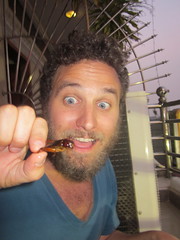 Update: Courtney and I did finally get to eat some bugs. After we returned to Phnom Penh in order to catch a bus to Saigon, I took a walk to the Central Market. I had to search forever, and if I hadn’t know that the word for spider was “ah-ping”, I would never have found them, right near the entrance to all the clothing stalls instead of among the freshly butchered chicken and fish, where I had been looking. Along with the assortment bag of bugs (including tiny frogs?), I had brought Courtney back a couple of gifts, including some freshly made banana sticky buns… in order to soften the blow. Courtney ate the leg of a spider, as did I, but she stopped at the crickets and the beetles. She definitely was less than happy to see the largest member of the group, the sausage-sized cockroach, but she held it for a sec and then looked on in horror as I forced my self to take a bite… The abdomen of a cockroach is probably not the best place to start, but I decided to not go for the head (“I can see it’s FACE”) or it’s legs (“who knows where those have been”). I quickly regretted my decision as my teeth tore out a chunk of its side; the inside of a cockroach, if you haven’t seen it before, is apparently filled with some sort of sponge-y looking thing, and for whatever reason this immediately triggered my gag reflex. I forced the sharp pieces down, but I’d already eaten enough roach for a lifetime.
Update: Courtney and I did finally get to eat some bugs. After we returned to Phnom Penh in order to catch a bus to Saigon, I took a walk to the Central Market. I had to search forever, and if I hadn’t know that the word for spider was “ah-ping”, I would never have found them, right near the entrance to all the clothing stalls instead of among the freshly butchered chicken and fish, where I had been looking. Along with the assortment bag of bugs (including tiny frogs?), I had brought Courtney back a couple of gifts, including some freshly made banana sticky buns… in order to soften the blow. Courtney ate the leg of a spider, as did I, but she stopped at the crickets and the beetles. She definitely was less than happy to see the largest member of the group, the sausage-sized cockroach, but she held it for a sec and then looked on in horror as I forced my self to take a bite… The abdomen of a cockroach is probably not the best place to start, but I decided to not go for the head (“I can see it’s FACE”) or it’s legs (“who knows where those have been”). I quickly regretted my decision as my teeth tore out a chunk of its side; the inside of a cockroach, if you haven’t seen it before, is apparently filled with some sort of sponge-y looking thing, and for whatever reason this immediately triggered my gag reflex. I forced the sharp pieces down, but I’d already eaten enough roach for a lifetime.
P.S. One of the great things going on in this country is the self-sufficient NGO phenomenon. Many of them have started restaurants, boutiques, or various programs to free themselves from international aid and become a self-funding entity. One of our favorites: Smile, an NGO-run restaurant that serves more than your regular Khmer fare (in fact some really outstanding dishes that we saw no-where else). “The aim of the project is to teach orphans and vulnerable children a trade, thus giving them a chance on the job market while also providing them with a safe place to live and a community of peers.”
